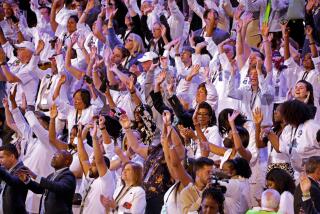‘92 DEMOCRATIC CONVENTION : That’s Just the Way the Poll Bounces : Public opinion: Support gained during party gatherings has little to do with election results in November.
- Share via
“This election is not about ideology. It’s about competence,” Michael S. Dukakis told cheering Democrats at their Atlanta convention four years ago. And within days, a host of polls showed the party’s new presidential nominee had skyrocketed, moving into a double-digit lead over Republican George Bush.
Dukakis lost to a very ideological Bush three months later, and the speeches and the surveys of July were forgotten. But as Arkansas Gov. Bill Clinton mounts the rostrum in Madison Square Garden on Thursday to accept this year’s Democratic nomination, the pollsters will be at it again.
Get ready for a spate of “bounce” polls--surveys likely to appear within hours of Clinton’s address that seek to gauge how much voter support he picks up in the wake of the convention. Politicians and the press will pour over the numbers to determine whether Clinton’s time in New York can be certified as a success.
What likely will be lost in all this is the very doubtful connection between post-convention bounces and events further down the campaign trail. The post-convention gains candidates get generally vanish in the ensuing weeks and seem quite unrelated to what happens after Labor Day.
Still, they interest the pundits and energize the campaigns.
One poll already has surfaced, and it predictably contained good news for Clinton. The survey conducted Monday night for the New York Daily News and the Hotline political newsletter found 35% of those interviewed backing Clinton, compared to 31% for Bush and 24% for prospective independent candidate Ross Perot.
The poll had an error margin of plus-or-minus 4.5 percentage points.
A review of Gallup polls before and after Democratic conventions from 1964 to 1988 shows that almost every Democratic nominee got some kind of bounce, whether he eventually won or lost. Losers Dukakis and Walter F. Mondale both got healthy boosts of 8 to 9 percentage points, as did Jimmy Carter in both of the years he was nominated in Madison Square Garden.
The exception--President Lyndon B. Johnson--gained not a point from the 1964 convention, but he won in a landslide.
So don’t expect Clinton to win or lose based on his bounce, particularly in this odd political year. A more important thing to look for in the poll numbers, CBS survey director Kathleen A. Frankovic says, is whether the convention can improve attitudes about Clinton’s honesty and character, an improvement that could persist longer than more fleeting horse-race gains.
A Surge at the Polls
Here is how Democratic candidates gained in polls taken after conventions. Numbers represent the percentage points the candidate picked up.
Post-convention Year Candidate Change Result 1988 Dukakis Plus 8 Lost 1984 Mondale Plus 9 Lost 1980 Carter Plus 10 Lost 1976 Carter Plus 9 Won 1972 McGovern Plus 5 Lost 1968 Humphrey Plus 3 Lost 1964 Johnson No change Won
Source: Gallup polls; based on Gallup polls taken immediately before and after convention.
More to Read
Get the L.A. Times Politics newsletter
Deeply reported insights into legislation, politics and policy from Sacramento, Washington and beyond. In your inbox twice per week.
You may occasionally receive promotional content from the Los Angeles Times.










